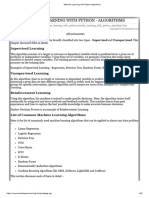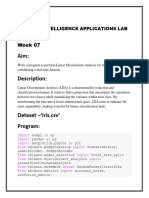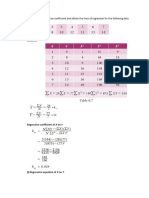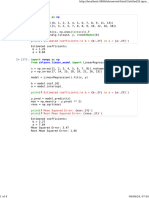Linear Regression Mca Lab - Jupyter Notebook
Uploaded by
Smriti SharmaLinear Regression Mca Lab - Jupyter Notebook
Uploaded by
Smriti Sharma28/08/2023, 13:22 linear regression mca lab - Jupyter Notebook
In [1]: #loading dataset
import pandas as pd
In [2]: #saving in boston object
boston=pd.read_csv("D:\smriti iitr and tarot material\data science and python course docs\data files for panda\Boston.csv")
In [3]: boston.head()
(https://getlin
Out[3]:
Unnamed: 0 crim zn indus chas nox rm age dis rad tax ptratio black lstat medv
0 1 0.00632 18.0 2.31 0 0.538 6.575 65.2 4.0900 1 296 15.3 396.90 4.98 24.0
1 2 0.02731 0.0 7.07 0 0.469 6.421 78.9 4.9671 2 242 17.8 396.90 9.14 21.6
2 3 0.02729 0.0 7.07 0 0.469 7.185 61.1 4.9671 2 242 17.8 392.83 4.03 34.7
3 4 0.03237 0.0 2.18 0 0.458 6.998 45.8 6.0622 3 222 18.7 394.63 2.94 33.4
4 5 0.06905 0.0 2.18 0 0.458 7.147 54.2 6.0622 3 222 18.7 396.90 5.33 36.2
In [4]: #different factors to determine house price
#now to find median size of house
#medv dependent variable
#any other independent variable like crim
In [5]: y= boston[["medv"]]
In [6]: x = boston[["crim"]]
In [7]: #import linear regression module from sklearn
#Scikit-learn is a free machine learning library for Python
#sklearn is a dummy project on PyPi that will in turn install scikit-learn
In [8]: from sklearn.linear_model import LinearRegression
In [9]: #before making model we have to divide our data set into train n test data
from sklearn.model_selection import train_test_split
In [10]: #before making model we have to divide our data set into traion n test data
In [11]: x_train, x_test, y_train , y_test =train_test_split(x,y,test_size= 0.3)
#x dependent variable , y independent , size test size
#30 % observations in test set , rest in train set
# x test , test set of dependent variable , x train train set (BECAUSE IT GIVES 4 RESULTS , SO
#4 OBJECTS )
In [12]: lr = LinearRegression()
#lr instantiate object, STORE INSTANCE OF LINEAR REGRESSION IN Lr
In [13]: lr.fit (x_train, y_train)
#model fit on training data
Out[13]: LinearRegression()
#predict values now on x_set
# train on traning set , predict on test set
In [14]: y_pred=lr.predict(x_test)
In [15]: y_test.head()
Out[15]:
medv
216 23.3
293 23.9
51 20.5
2 34.7
151 19.6
In [16]: y_pred[0:5]
#it has residual errors
Out[16]: array([[23.80451205],
[23.78965233],
[23.80540644],
[23.81185568],
[23.22266879]])
localhost:8888/notebooks/linear regression mca lab .ipynb 1/2
28/08/2023, 13:22 linear regression mca lab - Jupyter Notebook
In [17]: #calculate residual error,, for it import metrics
In [18]: from sklearn.metrics import mean_squared_error
In [19]: mean_squared_error(y_test, y_pred) #pass actual and predicated value , which is in y_pred
Out[19]: 81.57800347209668
In [20]: x = boston[["lstat"]]
(https://getlin
In [21]: x_train, x_test, y_train , y_test =train_test_split(x,y,test_size= 0.3)
In [22]: lr2 = LinearRegression()
In [23]: lr2.fit (x_train, y_train)
Out[23]: LinearRegression()
In [24]: y_pred=lr2.predict(x_test)
In [25]: y_test.head()
Out[25]:
medv
217 28.7
346 17.2
278 29.1
324 25.0
396 12.5
In [26]: y_pred[0:5]
Out[26]: array([[25.58101115],
[22.70333202],
[27.9951715 ],
[29.02843213],
[16.23338229]])
In [27]: mean_squared_error(y_test, y_pred)
Out[27]: 34.66868885942193
In [ ]:
localhost:8888/notebooks/linear regression mca lab .ipynb 2/2
You might also like
- MUNAR - Linear Regression - Ipynb - ColaboratoryNo ratings yetMUNAR - Linear Regression - Ipynb - Colaboratory30 pages
- Machine Learning With Python AlgorithmsNo ratings yetMachine Learning With Python Algorithms28 pages
- Multiple_Linear_Regression - ColaboratoryNo ratings yetMultiple_Linear_Regression - Colaboratory5 pages
- ML Experiment No 1 Linear Regression AnalysisNo ratings yetML Experiment No 1 Linear Regression Analysis3 pages
- Machine Learning Lab: Raheel Aslam (74-FET/BSEE/F16)No ratings yetMachine Learning Lab: Raheel Aslam (74-FET/BSEE/F16)4 pages
- C1 W1 Lab03 Model Representation Soln-Copy1No ratings yetC1 W1 Lab03 Model Representation Soln-Copy17 pages
- 01.multiple Linear Regression - Ipynb - ColaboratoryNo ratings yet01.multiple Linear Regression - Ipynb - Colaboratory10 pages
- Prediction of House Rent Using Multiple Linear RegressionNo ratings yetPrediction of House Rent Using Multiple Linear Regression20 pages
- SiddharthShah 1032221195 DivC 50 DL LabAssignment2No ratings yetSiddharthShah 1032221195 DivC 50 DL LabAssignment27 pages
- 2.1 ML (Implementation of Simple Linear Regression in Python)No ratings yet2.1 ML (Implementation of Simple Linear Regression in Python)8 pages
- Simple Linear Regression With Jupyter Notebook: Dr. Alvin AngNo ratings yetSimple Linear Regression With Jupyter Notebook: Dr. Alvin Ang16 pages
- Experiment Number: 3: Aim:-Study of The Linear Regression in The Machine Learning Using The Boston Housing Dataset. 1)No ratings yetExperiment Number: 3: Aim:-Study of The Linear Regression in The Machine Learning Using The Boston Housing Dataset. 1)14 pages
- A Brief Introduction to MATLAB: Taken From the Book "MATLAB for Beginners: A Gentle Approach"From EverandA Brief Introduction to MATLAB: Taken From the Book "MATLAB for Beginners: A Gentle Approach"2.5/5 (2)
- DI-C001-1339A Combined Upgrade Instructions 6135 - 6753 To 6742 PDFNo ratings yetDI-C001-1339A Combined Upgrade Instructions 6135 - 6753 To 6742 PDF36 pages
- Objectives of Indian Association For Medical InformaticsNo ratings yetObjectives of Indian Association For Medical Informatics2 pages
- Tokyo Cabinet and Tokyo Tyrant Presentation100% (22)Tokyo Cabinet and Tokyo Tyrant Presentation30 pages
- The Fuselage Cross Section and Nose Is Derived From That of TheNo ratings yetThe Fuselage Cross Section and Nose Is Derived From That of The6 pages
- National Apprenticeship Training Scheme (NATS)No ratings yetNational Apprenticeship Training Scheme (NATS)2 pages
- Tanishq Case Study - Recommendations For Dilemma FacedNo ratings yetTanishq Case Study - Recommendations For Dilemma Faced2 pages
























































































